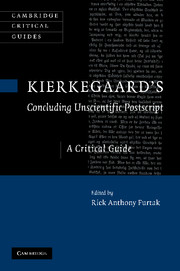Book contents
- Frontmatter
- Contents
- List of contributors
- Acknowledgments
- List of abbreviations
- Introduction
- 1 The “Socratic secret”: the postscript to the Philosophical Crumbs
- 2 Kierkegaard's Socratic pseudonym: A profile of Johannes Climacus
- 3 Johannes Climacus' revocation
- 4 From the garden of the dead: Climacus on interpersonal inwardness
- 5 The Kierkegaardian ideal of “essential knowing” and the scandal of modern philosophy
- 6 Lessing and Socrates in Kierkegaard's Postscript
- 7 Climacus on subjectivity and the system
- 8 Humor and irony in the Postscript
- 9 Climacus on the task of becoming a Christian
- 10 The epistemology of the Postscript
- 11 Faith and reason in Kierkegaard's Concluding Unscientific Postscript
- 12 Making Christianity difficult: The “existentialist theology” of Kierkegaard's Postscript
- Bibliography
- Index
- References
2 - Kierkegaard's Socratic pseudonym: A profile of Johannes Climacus
Published online by Cambridge University Press: 04 August 2010
- Frontmatter
- Contents
- List of contributors
- Acknowledgments
- List of abbreviations
- Introduction
- 1 The “Socratic secret”: the postscript to the Philosophical Crumbs
- 2 Kierkegaard's Socratic pseudonym: A profile of Johannes Climacus
- 3 Johannes Climacus' revocation
- 4 From the garden of the dead: Climacus on interpersonal inwardness
- 5 The Kierkegaardian ideal of “essential knowing” and the scandal of modern philosophy
- 6 Lessing and Socrates in Kierkegaard's Postscript
- 7 Climacus on subjectivity and the system
- 8 Humor and irony in the Postscript
- 9 Climacus on the task of becoming a Christian
- 10 The epistemology of the Postscript
- 11 Faith and reason in Kierkegaard's Concluding Unscientific Postscript
- 12 Making Christianity difficult: The “existentialist theology” of Kierkegaard's Postscript
- Bibliography
- Index
- References
Summary
The subject of this report is a fictional character and so-called pseudonymous author, one Johannes Climacus, a self-described “humorist” who is “thirty years old” and was “born in Copenhagen” (CUP 520). Only known relative, father, deceased (CUP 135). Possible physical features: “medium in height, with black hair and brown eyes.” Pastimes: “loafing and thinking”; “subjective author” of two books, Philosophical Crumbs (or Fragments) and Concluding Unscientific Postscript, both edited by S. Kierkegaard (CUP 156, 158). Philosophically notable characteristics: has an “ardent enthusiasm” for Socrates (KW 7: 111); seems to endorse the view he attributes to Socrates that being a philosophical “midwife … is the highest relationship a human being can have with another” person; has claimed with respect to his own development and philosophical undertakings that the “only one who consoles [him] is Socrates”; may himself be a Socratic figure, perhaps representing Kierkegaard's “idealization of the Socratic within the context of nineteenth-century Danish Christendom.”
Obtaining an understanding of Climacus has proved difficult; he remains under surveillance. The following (provisional) report includes an overview of Climacus' two works and the two therapeutic, experimental stances he adopts in relation to his readers (together with a few orienting observations about Climacus); a brief examination of Kierkegaard's unfinished manuscript Johannes Climacus, or De Omnibus Dubitandum Est; and a more detailed account of Climacus' diagnosis of what he thinks has gone wrong in Christendom and how this relates to his decision to become an author.
Keywords
- Type
- Chapter
- Information
- Kierkegaard's 'Concluding Unscientific Postscript'A Critical Guide, pp. 25 - 44Publisher: Cambridge University PressPrint publication year: 2010
References
- 2
- Cited by

